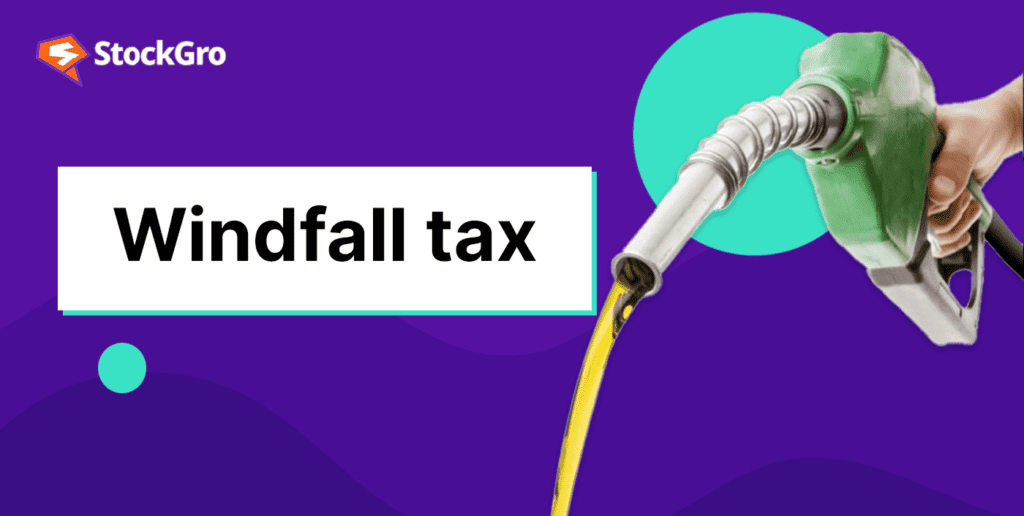
A windfall tax is a special tax that governments put on certain companies when they earn a lot more money because of economic changes This tax is mostly exercised on companies that deal with everyday goods like oil, gas, and coal when they make a lot of profit.
What is a windfall tax and how it works?
The windfall tax is imposed on unexpected or abnormal gains. Governments view this tax as a way to redistribute wealth, especially when certain industries, like oil and gas, benefit from external factors such as geopolitical tensions or supply constraints.
The fundamental goal of windfall taxes is to use a share of these extraordinary earnings, which are thought to outperform typical returns, for the public good. Governments state that these profits are due not only to the taxable entity’s efforts but also to external circumstances, justifying the redistribution of such benefits to benefit society as a whole.
Mostly, companies that sell oil and gas face windfall taxes. For instance, when their earnings went very high, the governments decided to impose extra taxes on them.
For example, in the past, when global oil prices went up, Indian oil and gas companies like ONGC and Reliance Industries made higher profits. The government sometimes considers a windfall tax on these companies to collect more money. This extra money can be used to help people and businesses who struggle with higher fuel and electricity costs.
While companies like ONGC and Reliance Industries might feel the pinch on their profit margins from windfall taxes, the overall impact is more nuanced. These taxes can reduce the funds available for reinvestment, which could slow down important activities like exploration and production.
On the other hand, windfall taxes play an important role in easing inflation, especially when it comes to essential goods like fuel and electricity. It’s a delicate balance—maintaining corporate profitability while ensuring the public benefits from lower costs.
You may also like: Tax saving scheme in India 2023 [Explained]
Windfall tax scenario in India
The windfall tax in India was introduced to ensure that the government could garner additional revenue from oil and gas companies due to the significant increase in crude oil prices in 2022. Here are some specific instances and details regarding the windfall tax imposed on Indian companies:
Introduction of windfall tax: The Indian government introduced a windfall tax on oil producers in July 2022. This tax was reviewed fortnightly, and in a review effective from 1 September 2022, the levies on domestically produced crude were raised to Rs 13,300 per tonne.
Initial tax rates: When the windfall tax was first imposed on July 1, 2022, the government set the tax rates at Rs 6 per litre on petrol and ATF (Aviation Turbine Fuel), and Rs 13 per litre on diesel.
Impact on companies: The imposition of the windfall tax was in response to the over 50% increase in crude costs in 2022, impacting refiners, including ONGC and Reliance. The management of ONGC and Oil India expressed surprise over this move by the government.
Windfall tax adjustments in India
The windfall tax scenario in India has witnessed several changes over the recent months:
New tax rates effective November 1, 2023: The central government has updated the windfall tax rates, which became effective on November 1, 2023. The entities mainly contributing to the revenue generated from these taxes include GAIL, Oil India, and ONGC, with an estimated total revenue of Rs 65,600 crore.
Increase in September 2023: On September 15, 2023, the windfall tax on petroleum crude was raised to Rs 10,000 per tonne from Rs 6,700 per tonne, with the increase coming into effect from September 16.
Further increase and subsequent reduction: The tax on petroleum crude saw a further hike to Rs 12,100 per tonne effective September 30, 2023, but was later reduced to Rs 9,050 per tonne effective October 18, 2023. Additionally, the levy on aviation turbine fuel was cut to Rs 1 per litre, and the windfall tax on diesel was reduced to Rs 4 per litre from Rs 5 per litre.
Possible phasing out: As oil prices began to moderate, Fitch Ratings mentioned that the five-month-old tax on windfall profits by oil companies would be phased out in 2023. The tax rates have been revised every fortnight based on prevailing international rates.
Earlier changes in 2023: In May 2023, the Centre had initially slashed the windfall tax on petroleum crude to zero from Rs 4,100 per tonne, but later reimposed a tax of Rs 1,600 per tonne.
The windfall tax debate
The windfall tax has been debated since the time it came into being. Some people like it because governments use the money for social help. Others don’t because they feel it takes away the interest of companies to earn profits. They believe companies should use profits to create new things which will help everyone.
Proponents of windfall taxes argue that they provide governments with a way to fund essential social programs, especially in times of economic strain and inflation. When large companies earn unexpected profits, it can seem fair to the government to redistribute some of that wealth to those affected by rising costs. The extra revenue can potentially be extended towards subsidies, welfare schemes, or infrastructure projects that benefit society at large.
On the flip side, critics point out that these taxes discourage investment, and innovation while reducing the company’s profit. When companies anticipate that higher earnings will be heavily taxed, they may hold back on exploring new opportunities or developing innovative technologies.
Thus, critics believe that imposing windfall taxes can stifle growth in industries that rely on high-risk, high-reward ventures like oil exploration. Additionally, it may send a message to businesses that success will be penalised, which can reduce competitiveness in the long run.
So, when it comes to windfall taxes, balancing social needs and corporate incentives remains a challenge that needs to be tackled by the government.
Also Read: How much tax do you pay on stock market gains?
Windfall taxes on individuals
Windfall tax can also affect people who suddenly get a lot of money like a big gift, inheritance, or money from game shows, gambling or lotteries. Usually, money received from family or friends, and life insurance is not taxed for the one at the receiving end.
However, the person giving the gift, the estate or giving the inheritance might have to pay the tax. Money won from lotteries or gambling is taxed and needs to be told to the tax department. If a person gets a big amount from winning a court case, they might have to pay tax, unless the money is for personal physical injuries or sickness, which is not taxed.
Tax Implications for Sudden Wealth
Receiving a large sum of money, whether from a lottery win, gambling, or an inheritance, brings unique tax responsibilities. For example, lottery and gambling winnings are often taxed at a flat rate, typically around 30% or more, depending on the country.
This means winners need to plan ahead and set aside a good portion of their earnings to cover taxes, avoiding any surprises or tax burdens down the road. Inheritance taxes can vary widely based on location, with some countries imposing estate taxes on the value of assets passed on. Without proper planning, taxes can significantly eat into the windfall.
Planning is Key
When someone unexpectedly comes into wealth, careful planning becomes essential. Speaking to a financial advisor or tax expert is a smart move to manage the tax impact and protect that newly acquired money. Strategies like setting up a trust, using tax-advantaged investment accounts, or donating to charity can help reduce the tax bill.
With the right guidance, individuals can make the most of their windfall while staying on the right side of tax laws. Thoughtful long-term planning also ensures that wealth is preserved and continues to grow, offering financial security for years to come.
Who has to pay a windfall tax?
Windfall tax is paid by companies or sectors which see a big jump in profits. This jump often happens when things like war, shortage of goods, or other big events that make the prices go up. Sometimes, people too have to pay this tax, when they get a lot of money suddenly from inheritance or winning a lottery. Understand tax implications for share trading and F&O.
Who benefits from windfall tax?
Governments collect windfall taxes and use them for different needs. In the times of World War I and World War II, money from windfall tax helped in war-related costs. In 1980, it was added to the general funds of the government. Recently, the EU Council in 2022 decided to use this tax money to help households and companies. This is to reduce the burden of high electricity prices on people.
Also Read: Old vs. New – Which income tax regime is better for FY 2023-24?
Advantages and Disadvantages of Windfall Tax
Despite criticism, windfall taxes offer several benefits.
- Increased Government Revenue: Windfall taxes generate additional revenue for the government, which can be directed towards public services, infrastructure, and economic recovery during downturns. This boosts overall economic growth by allowing the government to fund essential projects and social welfare programs.
- Promotes Fair Wealth Distribution: By capturing excessive profits, windfall taxes promote fair distribution of wealth across society. This ensures that only a few companies do not disproportionately benefit from favourable market conditions, leading to more equitable economic growth in the long term.
- Stabilises Prices: Windfall taxes can help regulate markets by preventing companies from making excessive profits. This contributes to keeping the prices of essential goods like fuel and energy stable and affordable for consumers, especially during times of economic volatility.
Disadvantages of Windfall Tax
Windfall taxes also come with several downsides.
- Reduced Business Profits: By taxing excess profits, windfall taxes leave businesses with lower revenues, which can limit reinvestment in the sector. This might affect the long-term growth of industries like energy or tech.
- Innovation Discouragement: Companies may become reluctant to take risks or innovate if they expect their profits to be heavily taxed during favorable conditions. This can slow down technological advances and product development.
- Market Uncertainty: Windfall taxes, often imposed unpredictably or retroactively, create uncertainty in the business environment. This may discourage future investments, as companies prefer stability in tax regimes for long-term planning.
- Higher Consumer Costs: Businesses may pass the cost of windfall taxes onto consumers to maintain profit margins, resulting in higher prices for goods and services, especially in sectors like energy.
- Employment Reductions: Companies might cut back on hiring or reduce their workforce to offset the financial burden of windfall taxes, which could slow economic recovery and job creation.
Which Industries or Sectors are Subject to Windfall Tax?
Windfall taxes typically target industries that are more likely to benefit from unexpected external events, such as geopolitical conflicts, supply chain disruptions, or sudden surges in demand. The most common sector affected by these taxes is the energy industry, specifically oil and gas companies.
When global events like wars, inflation, or supply shortages push oil prices higher, these companies often see a sharp increase in profits. To address these disproportionate earnings, governments impose windfall taxes to capture some of the excess revenue and prevent excessive corporate gains during crises.
The mining sector is another industry frequently subjected to windfall taxes. When the prices of precious metals or essential minerals rise due to supply chain issues or increased global demand, mining companies can enjoy significant financial windfalls. Governments use windfall taxes here to redistribute wealth and ensure that these gains are not concentrated solely within corporate coffers.
Financial services, especially banks, can also face windfall taxes, particularly during economic crises when government intervention helps stabilise profits. In these cases, windfall taxes are seen as a way to ensure that the financial benefits of government aid are shared with the broader economy.
Similarly, the telecommunications industry can be targeted, especially if it benefits from monopolistic practices or extraordinary profits from mergers and acquisitions. In these situations, windfall taxes ensure that a portion of these unexpected earnings is redirected to public welfare, rather than merely enriching shareholders.
These sectors are often singled out because their profits are closely tied to external market conditions rather than internal innovations or efficiencies. By imposing windfall taxes, governments aim to balance corporate profits with the broader needs of the economy, ensuring that these unplanned gains are used to benefit society as a whole.
How is Windfall Tax Calculated?
The calculation of windfall tax begins by determining what qualifies as “normal” profits for a company.
To do this, governments often rely on historical data, examining the average profits over several years to create a baseline. Profits that exceed this baseline are classified as windfall gains, and these are taxed at a higher rate compared to regular corporate earnings.
This ensures that companies are only taxed on profits deemed excessive due to extraordinary market conditions.
Another method governments use ties the tax directly to industry-specific benchmarks. In the oil sector, for example, the windfall tax might be calculated based on the average price per barrel over a decade. Any revenue generated from selling oil at a price higher than this long-term average would be considered windfall profit, subject to higher taxation.
Similarly, in the mining industry, the tax may be calculated based on a benchmark price for minerals. If a mining company earns above this benchmark due to price spikes, those profits are treated as windfall gains.
After identifying windfall profits, governments apply a tax rate, which can differ by country. Some nations opt for a flat tax rate, while others implement a progressive rate that increases with the profit size.
Additionally, certain exemptions might be granted to companies that reinvest their windfall profits into capital improvements or innovation projects, as a way of encouraging future growth. By using these calculation methods, governments aim to balance taxing excess profits without discouraging reinvestment or innovation in key industries.
The bottom line
Windfall tax is always a topic of discussion between the companies making more profits and the rest of the people. For example, the huge profit increase seen by oil and natural gas companies is making people talk about windfall taxes again.
The International Energy Agency says that the profits of these companies might double from 2021 to 2022, reaching a huge sum of around ₹150 lakh crore. For now, Exxon’s shareholders are benefiting as they got more dividends when Exxon announced a profit of nearly ₹1.5 lakh crore from July to September.
Investors of these companies are naturally focused on maximizing their returns. They keep a close eye on whether governments will step in with windfall taxes that could reduce dividends or share buybacks. This creates uncertainty in the market, as any significant tax could influence the company’s future growth plans or payouts to shareholders.
Furthermore, governments worldwide are increasingly considering windfall taxes on energy firms, particularly during periods of high inflation or energy crises. These taxes are seen as a way to fund economic relief programs, providing much-needed financial support to households burdened by soaring energy prices.
For instance, The European Union has actively discussed implementing such a tax as part of a broader strategy to address the economic impact of rising energy costs. The revenue generated from windfall taxes could be used to subsidize energy bills or fund other public welfare initiatives.
This trend reflects a growing global debate on how to balance corporate profits with public good. On one hand, companies argue that windfall taxes reduce their ability to reinvest in future projects, which could hurt long-term growth. On the other hand, proponents believe that redistributing these unexpected gains can help alleviate social and economic pressures, especially during times of crisis. This balancing act continues to be a key point of argument in financial and political discussions related to windfall tax.

